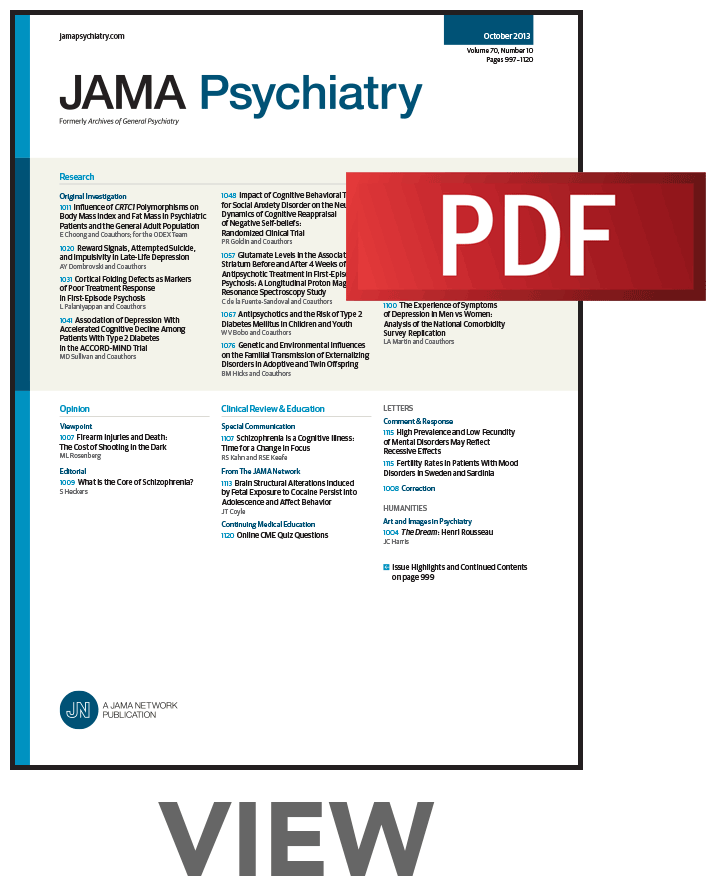Making Progress in Clinical Trials for Suicide Prevention
IF 22.5
1区 医学
Q1 PSYCHIATRY
引用次数: 0
Abstract
ImportanceSuicide is a public health crisis, and despite renewed efforts to confront this problem, suicide rates continue to rise in the US. While suicide prevention encompasses a broad array of strategies, treatment development is lagging. Within this realm, clinical trials are the criterion standard for evaluating safety and efficacy of new treatments.ObservationsMost clinical trials conducted among patients with mental illness have excluded patients at risk of suicide. Historical reasons for this include regulatory challenges, liability concerns, ethical questions, discomfort working directly with high-risk patients, and the belief that research is too risky for individuals at elevated risk for suicide.Conclusions and RelevanceSeveral considerations are provided for investigators in the design of trials targeting at-risk populations, including thoughtful selection of study outcome, use of time-to-event design and analysis (which may simultaneously satisfy ethical concerns and scientific aims), enrolling an enriched sample (eg, among patients recently discharged from the hospital), and provision of usual care in the comparator group. Caution should be exercised to avoid excessive or unreasonable safety requirements, which may lead participants to minimize self-report of suicidal ideation or to drop out of trials. Where possible, regulatory bodies (institutional review boards [IRBs] and data and safety monitoring boards) should consult with or include as members those with direct clinical experience with this high-risk population. An important ethical principle for IRB members and other regulators to consider is that suicide-related events are expected in this clinical population.预防自杀的临床试验取得进展
自杀是一场公共卫生危机,尽管人们再次努力应对这一问题,但美国的自杀率仍在继续上升。虽然自杀预防包括一系列广泛的策略,但治疗发展滞后。在这一领域,临床试验是评估新疗法安全性和有效性的标准。大多数在精神疾病患者中进行的临床试验都排除了有自杀风险的患者。这其中的历史原因包括监管挑战、责任担忧、伦理问题、直接与高风险患者一起工作的不适,以及认为对自杀风险较高的个人来说,研究风险太大。结论和相关性研究人员在设计针对高危人群的试验时需要考虑几个因素,包括仔细选择研究结果,使用事件时间设计和分析(可以同时满足伦理问题和科学目标),纳入丰富的样本(例如,在最近出院的患者中),以及在比较组中提供常规护理。应谨慎行事,避免过度或不合理的安全要求,这可能导致参与者尽量减少自杀意念的自我报告或退出试验。在可能的情况下,监管机构(机构审查委员会[irb]和数据和安全监测委员会)应该咨询那些对这类高风险人群有直接临床经验的人,或将他们纳入其中。IRB成员和其他监管机构需要考虑的一个重要伦理原则是,自杀相关事件在临床人群中是预期的。
本文章由计算机程序翻译,如有差异,请以英文原文为准。
求助全文
约1分钟内获得全文
求助全文
来源期刊

JAMA Psychiatry
PSYCHIATRY-
CiteScore
30.60
自引率
1.90%
发文量
233
期刊介绍:
JAMA Psychiatry is a global, peer-reviewed journal catering to clinicians, scholars, and research scientists in psychiatry, mental health, behavioral science, and related fields. The Archives of Neurology & Psychiatry originated in 1919, splitting into two journals in 1959: Archives of Neurology and Archives of General Psychiatry. In 2013, these evolved into JAMA Neurology and JAMA Psychiatry, respectively. JAMA Psychiatry is affiliated with the JAMA Network, a group of peer-reviewed medical and specialty publications.
 求助内容:
求助内容: 应助结果提醒方式:
应助结果提醒方式:


